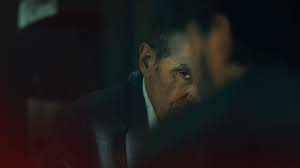Face to Face with ETA: Conversations with a Terrorist 2023 Movie Review
‘Don’t call me Veal’ is a documentary interview that starts from a painful surprise. The report begins with a conversation with a former police officer and victim of terrorism, Francisco Ruíz Sánchez, who is surprised to discover details of the day he was shot, almost 50 years ago. The rest of the interview is a face to face based on shot versus shot that, as is usual in Jordi Évole’s work, does not mince words. language and touches more than ever on a conflictive topic, a wound that is still open today. And he does it by doing a chronological review and of course using archive images.
‘Don’t call me beef’ is an uncomfortable confrontation for both parties. Proof of this is the same title that is part of the constant denial by Josu Urrutikoetxea alias Ternera to be referred to by a nickname that, according to him, was not chosen and as such he has never used it. Despite how intimidating they can be mutually, one exhibits his approaches without hesitation or half-measures and the other carefully measures his words, with a speech that has been evolving and internalized over the years, typical of someone who has been wrong for a long time. in a calamitous way and still tries to recondition his speech to maintain his cause. This film shows us the terrorist carefully avoiding saying certain things or using certain terms to offer his version, of course, avoiding mentioning some people. For him the attacks were actions, for example. On the contrary, Évole formulates the questions and also adapts them based on the story offered by the interviewee to, without any fear, put him on the ropes.
It is an interview with a lot of historical value that may outrage many, since it may seem that it is giving voice to a member of the extinct E.T.A. But in my opinion Veal has shown himself too much and has portrayed himself as many of us really thought he was. In his attempts to zigzag through the different stages of history that Évole enumerates, the Abertzale is exposed and unmasked. He tries to move through a gray area in which he is only rarely justified. He catches him in more than one waiver, such as when he talks about classifying the victims or the comparison with the jihadists.
‘Don’t call me Veal’ moves through three sides of the same thing: the victim, the interviewer and the gang member. Three very different visions found only at certain points in the story that also serve to show that in Spain all the participants in history have met in one way or another. Now that there is so much talk about amnesty, those who have a weak memory will see everything that the Aznar government did, especially all the mistakes and successes that the different PSOE legislatures made. It does not support Josu Tenera’s career at all, but there is an intention towards understanding, conciliation and dialogue. That is why ‘Don’t call me Veal’ is perceived as something daring and controversial. Even more so than works like ‘Fe de ETArras’, ‘The invisible line’. Seeing the conflict from these perspectives may help us overcome it and turn the page, evolving as a society in peace and democracy.’Patria’, ‘Maixabel’ or




